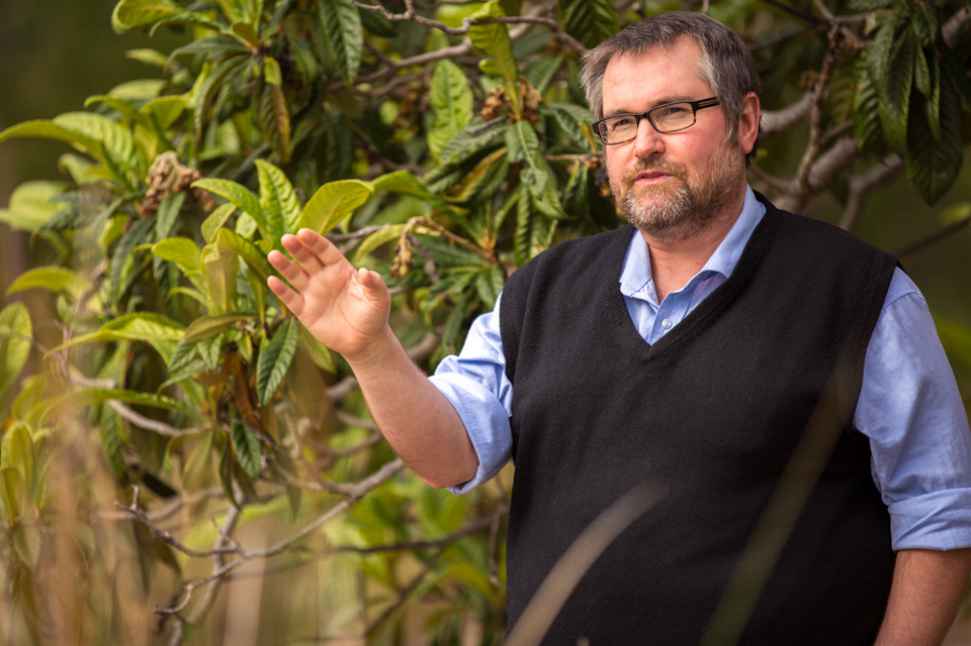Crusader for the future of our planet
Groundwater may be hidden – but don’t underestimate its importance, says South Australian 2015 Scientist of the Year, Matthew Flinders Distinguished Professor of Hydrogeology Professor Craig Simmons.
While out of sight often means out of mind, the Director of the National Centre for Groundwater Research and Training (NCGRT) at Flinders University is concerned with the conservation and quality of the life-giving water for future generations.
Hotter, dryer conditions with climate change and the potential impacts of mining and hydraulic fracturing (“fracking”) on valuable aquifers are adding to the urgency of his research, training and policy campaign.
He says the water we rely on so heavily might not be visible, including more than 30% of the water Australia uses every year, but groundwater depletion and pollution is accelerating at unsustainable levels globally.
The alarm bells are ringing, particularly in light of the rising world population and an additional 2 billion more people to feed by 2030.
“Groundwater makes up almost all of the available freshwater on our planet: more than 97% of fresh water on Earth lies in the ground beneath our feet,” Professor Simmons says.
“Groundwater supplies half of the world’s drinking water and 43% of the water used to grow food.
“UNESCO reports current global groundwater extraction is approaching 1000 cubic kilometres a year – more than 13 times the annual flow over Niagara Falls – and it shows no signs of slowing.
Australia also needs to “remain vigilant and not become complacent,” with many government groundwater initiatives and funding drying up in recent years, Professor Simmons says.
His sentiments were echoed by former Flinders University Vice-Chancellor Professor Ian Chubb in a parting interview as Australia’s Chief Scientist in late 2015.
“Somebody’s got to take responsibility for it and it’s got to be one group,” Professor Chubb said, calling for a single body to guide Australia’s long-term water strategy.
“I can’t imagine that we can just continue, for example, to pull water out of the aquifers without understanding them much better than we do,” Professor Chubb told The Weekly Times newspaper.
“I can’t believe we can just depend on occasional rains, these episodic bursts of rainfall, the dry semi-drought in some areas and real drought in other parts.”
Over many years, leading groundwater authority Professor Simmons, who holds the Schultz Chair in the Environment at Flinders University, has coordinated research and been a significant contributor to efforts on a number of important fronts in Australia, including:
- Monitoring the successful implementation of, and improvements to, the Murray-Darling Basin Plan;
- Advising on the impacts on groundwater reserves of unconventional gas and fracking;
- Investigating the role of groundwater in urban and rural water security;
- Securing water resources in the Great Artesian Basin;
- Adding to discussions on opening Northern Australia to irrigation and future development;
- Understanding the impact of mining on groundwater;
- Assessing the impacts of climate change on groundwater collection.
“These and many other issues will require rigorous groundwater science, management and policy,” Professor Simmons says.
Much more also needs to be done in areas such as underground dams, where water can be drawn down into the aquifer in wet weather to use during the wet season.
“In a hot, dry land like Australia, we cannot afford to ignore groundwater and integrated management of both surface water and groundwater will be critical to protect and maximise our scarce water resources.
“There are so many challenges and opportunities in Australia and around the world in which groundwater is front and centre.
“If we rise to the challenge, the pay-offs for current and future generations will be huge.”
Professor Simmons is a Fellow of the Australian Academy of Technological Sciences and Engineering and has recently joined the US National Academies of Sciences, Engineering and Medicine Roundtable on Unconventional Hydrocarbon Development.
Story by: Tania Bawden



